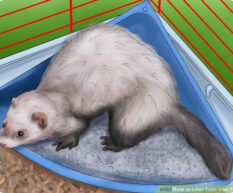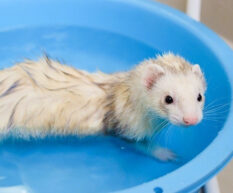Ferret News
Feeding your ferrets eggs: Two perspectives
By Courtney Stoker

By accident, we assigned an article on feeding ferrets eggs to two of our authors! But our silly mistake is your gain. Both Dr. Meissner and Ms Grech researched eggs and ferrets, providing different perspectives on whether eggs are a healthy addition to your ferrets’ diet and how they should be served. We hope you find their pieces useful in deciding how to feed your own ferrets!
Elizabeth Grech
Eggs are a very good source of protein, calcium, magnesium, zinc, iron, potassium among many others and also contain various Vitamins, like B12, B6, A, D and E.
Giving the eggs raw is a very healthy supplement for many animals. So much so, that it is sometimes a last resort for weak animals and can actually save their life!
“Free range raw eggs (ideally from healthy chickens, including organically certified, even better are fertile eggs) are one of the best compact foods in nature. Eggs are the ultimate, complete fast food. However the protein in eggs is not utilised for cellular reproduction. They are utilised for regeneration and maintenance. The relationship between raw eggs and salmonella poisoning is a myth”
Quote from the book “The Recipe for Living Without Disease” By Aajonus Vonderplanitz
Raw feeding is generally a better option when feeding food to ferrets. Salmonella isn’t really an issue for ferrets since their bodies are designed to manage such microorganisms. They have a short intestinal tract that passes food before bacteria have the time to act up. However, it might be a little bit messy. If your fuzzy is sick, you might want to inject the egg yolk with a syringe directly to their mouth (consult a vet first).
With regards to cooked eggs, just like other food items when exposed to heat, the protein and fats are altered, so I suggest feeding raw eggs to retain all the nutrients.
Apart from being a miracle food, the ferrets just love licking or eating eggs and it can be a distraction during a nail trim. Sometimes I take some yolk with me to the vet, so that he can check the ferrets without them jumping all over the place.
Eggs need to be given as a treat, since they are not a meal substitute. The overall consensus at the Holistic Ferret Forum is to give no more than 2 eggs a week. Personally, I give 1 quail egg on alternate days, since they are smaller and have more egg yolk than egg white.
The yolk is the most nutrient-rich part of the egg. If taken in its entirety, the egg is still just as healthy, but you should moderate how many egg whites you feed your ferret. If you have more than one ferret, mix the egg(s) thoroughly, so that each ferret gets a good balance of yolk and white.
The reason why the white is slightly frowned upon is that it can cause biotin deficiency. This can lead to certain disorders affecting the skin, hair, and nails, as well as the nervous system.
In “The Great Egg Panic,” an article published in the Los Angeles Times on January 5, 2000, Emily Green says that even though the white of the egg can affect the assimilation of biotin, the yolk actually has extra biotin that balances out the deficiency. Avidin, which is what activates biotin absorption and is found in the egg white, is destroyed when cooked, so for this reason, giving boiled eggs might be preferred by some.
Eggs are a rich treat that your ferrets will love, but you may not love what it does to their poop. Eggs can cause more smelly excrement!
Rose-Anne Meissner, PhD
Eggs are a great healthy treat for your ferret. Rich in nutrients, they are high in protein and contain biotin, riboflavin, selenium, vitamin D, choline, lutein, and zeaxanthin. We found several sources that recommended ferrets eat no more than two eggs a week as a supplement to a healthy diet. More than two eggs a week can cause constipation.
Raw versus cooked eggs
It depends on who you ask: there are different opinions within the ferret community about egg preparation for your fuzzy. On the website My Ferret Pet, an anonymous author writes, “There are no nutritional benefits to feeding raw eggs–plus they can cause a big mess.” The author recommends scrambling eggs in some oil for your ferret. You can also use boiled eggs, which have the advantage that they can easily be done in advance.
In favor of raw eggs are those who advocate for an “ancestral diet,” a diet more similar to what the ancestors of ferrets evolved to eat. Even if you aren’t afraid of some messy fun, you may have concerns about Salmonella, as fear of Salmonella poisoning is one of the reasons we humans have to be careful about eating raw eggs. Salmonella is a type of bacteria, often found on poultry and poultry products like eggs. It can cause intestinal illness and even death in severe cases.
We found conflicting information regarding ferrets’ risk for Salmonella poisoning. At Beyond the Treat, Zach David argues that ferrets are protected from Salmonella-induced illness because of their short intestinal tracts. In “Biology and Diseases of Ferrets,” Joerg Mayer and colleagues confirm that indeed, ferrets do have short intestinal tracts relative to their body size. A ferret’s “gastrointestinal transit time” (from food ingestion to excretion) can be as short as 3 hours. But these authors also caution against feeding ferrets raw chicken, beef, or other meats because of concerns about bacteria, including Salmonella. The authors don’t mention raw eggs in their list of raw foods.
Ultimately, it is your decision as to whether you choose cooked or raw eggs for your ferret. If you are interested in using raw eggs, I think it would be good to consider how fragile your ferret is, healthwise. Ferrets who are very young, very old, or coping with a weakened immune system are more vulnerable to Salmonella infections. I would feed cooked eggs to fragile ferrets because, in my opinion, the risk of infection would not be worth any potential benefits.
White, yolk, or both?
You can feed your ferret whole eggs or just the yolks, depending on your preference or what you have available. You’ll want to avoid feeding them just egg whites because there is a risk of causing a biotin deficiency in your fuzzy. Egg yolks are rich in biotin, but egg whites contain a protein called avidin. Avidin binds biotin and can make its absorption more difficult. Biotin deficiency can cause serious health problems; symptoms of biotin deficiency include “alopecia [fur loss], hyperkeratosis [thickening of the skin that can lead to corns and calluses], graying of fur, conjunctivitis [“pink eye” or swelling and inflammation of the eyelid], and fatty liver,” according to veterinarian Cathy A. Johnson-Delaney in a 2014 paper on ferret nutrition. She notes that commercial ferret foods contain biotin to provide 10 micrograms of the nutrient per kilogram of body weight for a ferret, which is twice the amount of biotin that dogs need in their diets.
If you opt for raw eggs for your ferrets, you can encourage them to eat the yolk by lightly scrambling the raw egg. And of course, for cooked eggs, you can scramble them before you cook or mix together cooked white with cooked yolk (if you are using boiled eggs, for example).
It is easiest to incorporate eggs into a ferret’s diet if she tries them at a young age. So let those kits have some eggs and remember that eggs are an occasional treat, not a daily staple for ferrets.
Further reading
“Can Ferrets Eat Eggs–Raw or Cooked?” My Ferret Pet. https://myferretpet.com/2014/05/can-ferrets-eat-eggs-raw-or-cooked.html Accessed 8 September 2019. (Web page)
“Can I Give My Ferret an Egg?” Can I Give My Ferret…? Published on 9 June 2013. https://www.canigivemyferret.com/an-egg/. Accessed 8 September 2019. (Web page)
David, Zach. “Can Ferrets Eat Eggs?” Beyond the Treat. https://www.beyondthetreat.com/can-ferrets-eat-eggs/. Accessed 8 September 2019. (Web page)
Green, Emily. “The Great Egg Panic.” Los Angeles Times. Published on 5 January 2000. https://www.latimes.com/archives/la-xpm-2000-jan-05-fo-50795-story.html. Accessed 20 October 2019. (News article)
Johnson-Delaney, Cathy A. “Ferret Nutrition.” Veterinary Clinics of North America: Exotic Animal Practice, volume 17. Published in 2014. Pages 449-470. (Scholarly article)
Kupersmith, David S. “A Practical Overview of Small Mammal Nutrition.” Seminars in Avian and Exotic Pet Medicine, volume 7, number 3. Published in 1998. Pages 141-147. (Scholarly article)
Mayer, Joerg; Robert P. Marini; and James G. Fox. “Biology and Diseases of Ferrets,” Laboratory Animal Medicine, Third Edition. Published in 2015. Pages 577-622. (Book chapter)
“Nutrients in Eggs.” Egg Nutrition Center. https://www.eggnutritioncenter.org/topics/nutrients-in-eggs/. Accessed 8 September 2019. (Web page)
“Salmonella Infection in Ferrets.” Pet MD. https://www.petmd.com/ferret/conditions/digestive/c_ft_salmonellosis. Accessed 8 September 2019. (Web page)
“The Ins and Outs of Feeding Eggs.” Ferret Edu. Published on 30 July 2014. https://ferretedu.weebly.com/blog/the-ins-and-outs-of-feeding-eggs. Accessed 8 September 2019. (Web page)





